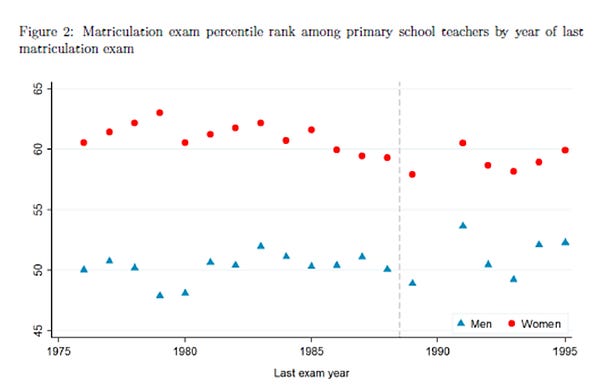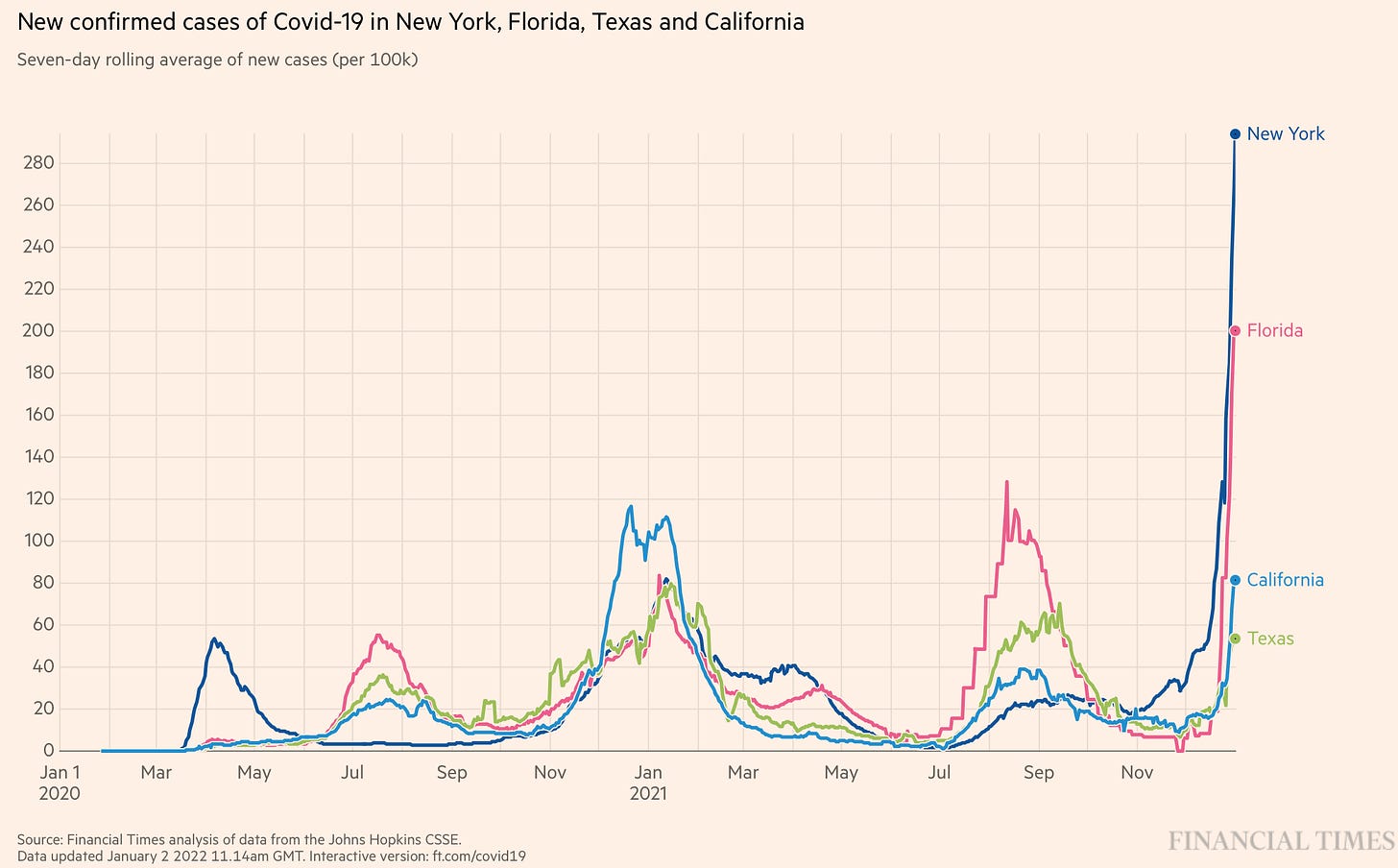Condition: OMICRON
First: South African Omicron Mortality 0.3% vs. Delta 2%
Yes, the South African population had more acquired immunity vis-à-vis against Omicron than it had had against Delta earlier, but so do we, and so does everybody else. And it now looks like Omicron mortality was 0.3% of reported cases, compared to Delta and earlier mortality of 2% of reported cases:
Influenza in the United States hits 20 million people a year, and kills 20,000—an 0.1% mortality rate. Omicron in the United States looks now to be a measles-contagious triple flu. If it hits 100,000,000 people, that is still 300,000 more deaths. But it is so much better than it might have been.
On the other hand, effectively hunkering down for a month is really, really difficult for American society, given how contagious it has turned out to be. California looks to have a very bad next month, as far as case numbers are concerned:
South Africa Omicron was up-and-down in a month, but the past two years have taught us that epidemic waves follow very different trajectories in different countries, for reasons that I at least do not understand—complicated by the fact that reported case numbers are garbage, and hospitalizations and deaths are reported with too long a lag to be useful for assessment and planning in the moment:
I confess that if I were the Chancellor of the University of California, I would not know what to do right now. A reopened U.C. Berkeley in January would, if a quarter of us wound up catching cases significant enough to be reported, generate perhaps 30 deaths among elderly staff and teachers and their relatives. But those deaths would be overwhelmingly among those who have chosen not to get vaxxed and boosted. A considerable proportion of those deaths would occur with a fully-closed U.C. Berkeley. What proportion? I cannot guess.
I think I would go fully-remote until February 5, and then reassess, with a strong bias towards reopening. But I will not say that I am confident in my judgment here.
One Video:
Sabine Hossenfelder: The Physics Anomaly No One Talks About: What’s Up with Those Neutrinos?<https://www.youtube.com/watch?v=p118YbxFtGg&t=606s>
One Picture:
Ready to record remote lectures () for Spring 2022:
Very Briefly Noted:
David Lindsay Roberts: How the US census Led to the First Data Processing Company 125 Years Ago: ‘The founding of the first automated data processing company, the Tabulating Machine Company, 125 years ago on December 3, 1896… <https://arstechnica.com/science/2022/01/how-the-us-census-led-to-the-first-data-processing-company-125-years-ago/>
Rana Foroohar: Why We Should Expect Wobbling in Global Inflation Dynamics: ‘Modelling on data of past 50 years may be hard with a ‘bullwhip’ economy… <https://www.ft.com/content/9444643e-9d43-4e5f-92d8-78c64c9414db>
Wikipedia: Khoisan: ‘The populations ancestral… [were] the “largest human population”… from their early separation before 150 kya until the recent peopling of Eurasia some 70 kya… dispersed throughout much of southern and southeastern Africa… <https://en.wikipedia.org/wiki/Khoisan#Origins>
Philippe Lemoine: Have We Been Thinking about the Pandemic Wrong?: ‘[With] quasi-homogeneous mixing populations that are internally well-connected but only loosely connected to each other, the effective reproduction number can undergo large fluctuations even in the absence of behavioral changes… <https://cspicenter.org/blog/waronscience/have-we-been-thinking-about-the-pandemic-wrong-the-effect-of-population-structure-on-transmission/>
Duncan Black: Eschaton: Good Boys and Good Girls: ‘Flashbacks to the Obama administration…. Righteous certainty among people who succeeded because they knew who to check all the right boxes when they were 15…. Not a lot of self-doubt, not a lot of self-recrimination. Among other things, it’s a worldview which is very unsympathetic to the failure of others… <https://www.eschatonblog.com/2021/12/good-boys-and-good-girls.html>
Kristen V. Brown: Can Omicron Escape Vaccines & Boosters?: ‘The vaccines still appear to be doing their most important job…. Omicron is very good at getting past a vaccine’s first line of defense, antibodies…. [But] omicron is still easily defeated by a vaccine’s second line of defense, T cells and B cells… <https://www.bloomberg.com/news/newsletters/2022-01-02/can-omicron-escape-vaccines-and-boosters>
Dhruve Merota: D.C. Police Tried To Fire 24 Current Officers For ‘Criminal Offenses.’ A Powerful Panel Blocked Nearly Every One, Documents Show – DCist: ‘D.C. Police Tried To Fire 24 Current Officers For ‘Criminal Offenses.’ A Powerful Panel Blocked Nearly Every One, Documents Show… <https://dcist.com/story/21/12/18/dc-police-panel-blocked-mpd-firings/>
Arian Campo-Flores & Scott Calvert: Surfside, Fla., Condo Collapse: From Glimmering Beaches to Ruin: ‘Champlain Towers South’s deterioration over decades led to one of the deadliest building failures in U.S. history… <https://www.wsj.com/articles/surfside-fla-condo-collapse-from-glimmering-beaches-to-ruin-11640773804>
Ursina Schaede: ’Finland had a quota that reserved 40% of study slots to become a primary school teacher for male applicants…


Angela Rasmussen: ’What is it about cryptocurrency that convinces enthusiasts they are uniquely qualified to correct experts in other fields? Seriously 10/10 randos declaring that I need to Google virology have laser eyes, incessantly post about ethereum or whatever, & ooze palpable insecurity…

Peter Hotez: ’Not a question of being scared. I’m not frightened…I’m horrified. Since June 2021: 200,000 unvaccinated Americans lost their lives due to COVID despite widespread availability of vaccines. 200,000 Americans needlessly died because they believed disinformation from the far right…


Paragraphs:
Uri: A Recap of [Neal Postman’s] “Amusing Ourselves To Death”: ‘The real model for our present is not Orwell’s 1984 (1949) but Aldous Huxley’s Brave New World (1932). “What Orwell feared was those who would ban books; what Huxley feared was that there would be no reason to ban a book, for there would be no-one who wanted to read one…. Orwell feared that the truth would be concealed from us; Huxley feared the truth would be drowned in a sea of irrelevance.” As Huxley later wrote: “The civil libertarians and rationalists who are ever on the alert to oppose tyranny fail to take into account man’s almost infinite appetite for distractions. In 1984, people are controlled by inflicting pain; in Brave New World, by inflicting pleasure”…
LINK: <https://www.atvbt.com/amusing-ourselves-to-death-neil-postman/>
Jordana Cepelewicz: Mental Phenomena Don’t Map Into the Brain as Expected: ‘Poldrack agreed. “I don’t think any of us would want to tell people: Don’t use the word ‘memory’ anymore,” he said. But to understand the brain, we might need to challenge our intuitions about how it works…. Another important consideration is how meaningful a new framework might end up being. “You may gain in terms of knowledge, but you may actually stop understanding yourself,” Krakauer said…
LINK: <https://www.quantamagazine.org/mental-phenomena-dont-map-into-the-brain-as-expected-20210824/>
W. Amos & J. I. Hoffman (2009): Evidence that Two Main Bottleneck Events Shaped Modern Human Genetic Diversity: ‘Analysing a large published dataset of 783 microsatellite loci genotyped in 53 worldwide populations…. Immediately following a sharp population decline, rare alleles are lost faster than heterozygosity, creating a transient excess of heterozygosity relative to allele number…. We find evidence of two primary events, one ‘out of Africa’ and one placed around the Bering Strait, where an ancient land bridge allowed passage into the Americas. These findings agree well with the regions of the world where the largest founder events might have been expected, but contrast with the apparently smooth gradient of variability that is revealed when current heterozygosity is plotted against distance from Africa…
LINK: <https://www.ncbi.nlm.nih.gov/pmc/articles/PMC2842629/pdf/rspb20091473.pdf>
TV Tropes: Filibuster Freefall: ‘Art tends to draw fringe personalities. Be they left-wing or right-wing, sexually liberated or restrictive, bearing funny ideas on everything from drugs to health care to the wearing of funny hats on Sundays, creative types usually have their ideas and stick to them. Usually, however, they manage to stay separate from the work, or if they’re worked in, they’re blended in a way that adds to the quality of the work or at least doesn’t detract from the main thrill ride. There are some cases, however, where a strange combination of the author’s prestige, personal life, and political bent causes things to take a strong shift. Suddenly, you’re cracking open the latest book in a rollicking fantasy series and there’s a hundred page section on how people wearing funny hats on Sunday should be sentenced to death by firing squad. Where once there was flirting, things have gotten overtly lewd and even hideously porny. Where once there was fun military action, there are now long sections on the moral failings of the Clinton administration. Something has cracked, and the author has ended up firmly in Filibuster Freefall…
LINK: <https://tvtropes.org/pmwiki/pmwiki.php/Main/FilibusterFreefall>
Adam Gurri: The Case Not Made: A Response to Anne Applebaum’s “The New Puritans”: ‘Many of [Anne Applebaum’s] specific claims rest upon even weaker reeds than this. In one case she tells readers that “At least two of the people I interviewed believe that they were punished because a white, male boss felt he had to publicly sacrifice another white man in order to protect his own position,” as though anonymously speculating that the white man’s guilt of their bosses was the cause of their unspecified misfortune constitutes any kind of credible evidence of the truth of those speculations. In another she quotes a different anonymous professor who “thought that one of his colleagues resented having to work with him.” In a third she mentions that Yale Law professor Amy Chua “believes that investigations into her relationships with students were sparked by her personal connections to Supreme Court Justice Brett Kavanaugh”…
LINK: <https://www.liberalcurrents.com/the-case-not-made-a-response-to-anne-applebaums-the-new-puritans/>









Speaking of the Rasmussen graf: My problem with crypto isn't the bros. Fools gonna be fooled; jerks gonna jerk. Instead, I'm angry with the press, that keeps treating the topic as novel and legit despite 15 years of solid evidence to the contrary.
That Finnish teacher study -- there's an immense structural difference between trying to produce optimality and trying to produce sufficiency.
If you go "best on the test", you're trying to produce optimality. Never mind if you have, or could have, written a test able to identify optimal capability. Structurally, systemically, you're trying to produce an optimal outcome.
If you filter the applicant pool by checking for sufficiency -- does the applicant have scores above the minimum for each of the following areas of concern? -- and then, if necessary, filling spaces by lot from a potentially too-large pool of applicants, you get (as the study found!) better results.
That happens whenever we can't know the optimal outcome; providing a more diverse pool of good-enough gives better odds of effective responses to both unknown and novel requirements. Since teaching careers are meant to be long, some requirements are unknown (or the test-for-the-optimum approach would work better!) and the future always contains novelty, sufficiency is obviously a better approach to selecting teachers than optimality.
It's important to watch out for someone trying to do optimality via notional sufficiency and adjusting the definition of sufficiency to that end; it's important to be sure the things you're checking as part of sufficiency are important to the job you want done. But in general, for long careers, sufficiency approaches will work better.
It's a pity people hate them so much.